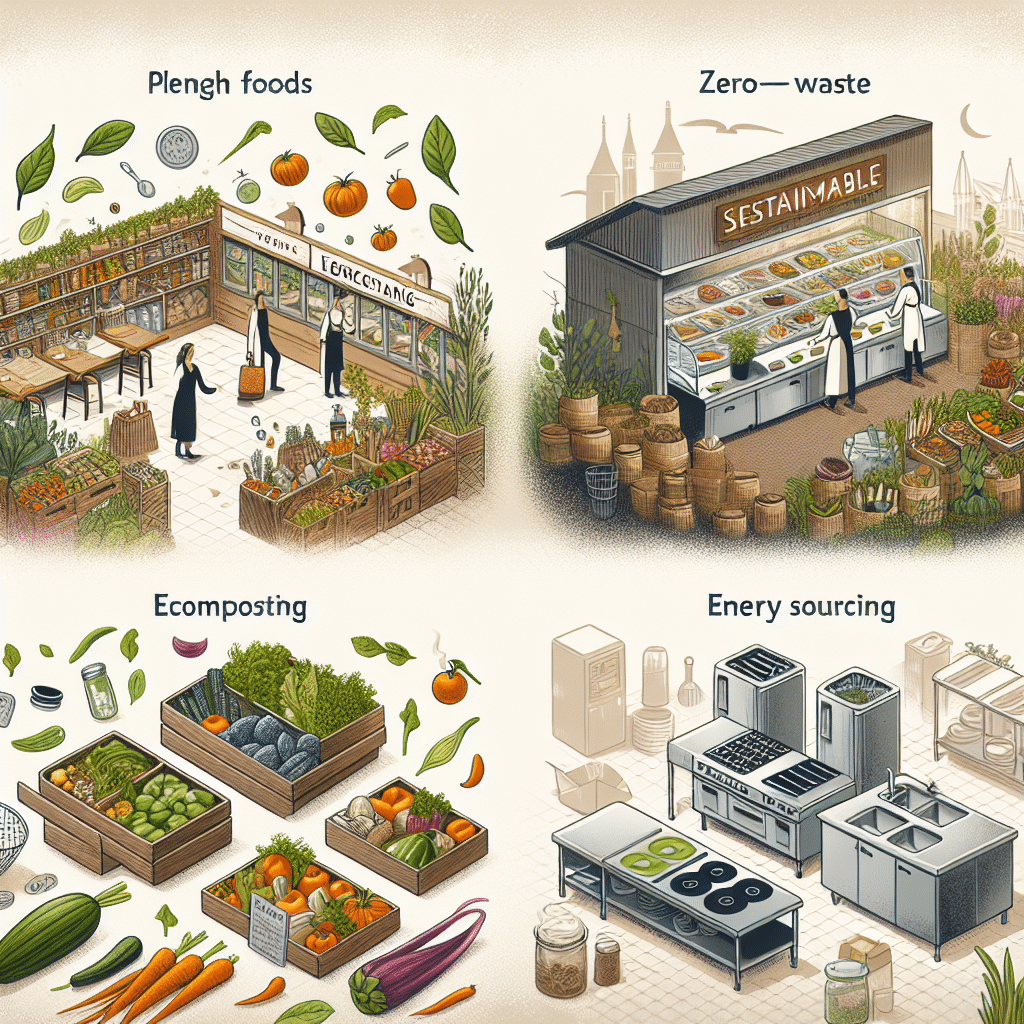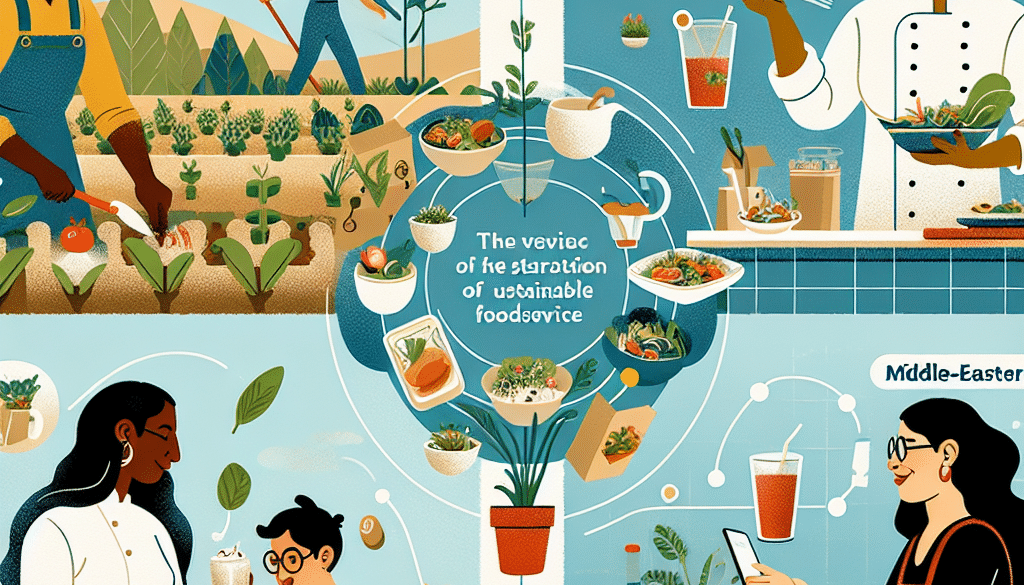4 Trends Shaping the Evolution of Sustainable Foodservice
-
Table of Contents
Sustainable Foodservice Evolution: 4 Key Trends to Watch

The foodservice industry is undergoing a significant transformation as sustainability becomes a central focus for consumers, businesses, and governments alike. As the demand for eco-friendly practices and products grows, the industry is adapting to meet these expectations. This article explores four trends that are shaping the sustainable evolution of foodservice, offering insights into how these trends are changing the way we produce, consume, and think about food.
1. Plant-Based Menus and Alternative Proteins
One of the most visible trends in sustainable foodservice is the rise of plant-based menus and alternative proteins. Driven by concerns about health, animal welfare, and the environment, more consumers are seeking out vegetarian, vegan, and flexitarian options. This shift is prompting restaurants and foodservice providers to expand their offerings to include plant-based meats, dairy alternatives, and other innovative products.
- Statistics show that the plant-based food market is expected to grow significantly in the coming years, with a compound annual growth rate (CAGR) of 11.9% from 2020 to 2027.
- Case studies of companies like Beyond Meat and Impossible Foods illustrate the potential for plant-based proteins to disrupt traditional meat markets.
- Restaurants are increasingly partnering with these companies to offer plant-based burgers, sausages, and more, appealing to a broader customer base.
2. Zero-Waste Initiatives and Circular Economy
Another trend shaping sustainable foodservice is the focus on zero-waste initiatives and the adoption of circular economy principles. Food waste is a significant issue, with a large percentage of food produced globally going to waste. To combat this, foodservice businesses are implementing strategies to reduce waste at every stage of the supply chain.
- Composting, recycling, and upcycling are becoming more common practices in restaurants and cafeterias.
- Some establishments are adopting nose-to-tail and root-to-stem cooking methods to utilize every part of the ingredients they purchase.
- Technology is playing a role in waste reduction, with apps and software helping businesses track and manage inventory more efficiently to prevent overordering and spoilage.
3. Local and Seasonal Sourcing
Local and seasonal sourcing is a trend that not only supports sustainable foodservice but also helps boost local economies. By sourcing ingredients from nearby producers, foodservice providers can reduce their carbon footprint associated with transportation, ensure fresher produce, and support local farmers and suppliers.
- Restaurants are increasingly highlighting local and seasonal items on their menus, often featuring the stories of the farmers and producers they work with.
- Farm-to-table concepts are gaining popularity, with some restaurants even starting their own gardens or farms to supply their kitchens.
- Local sourcing also allows chefs to be more creative with their menus, designing dishes around what is available and in season.
4. Eco-Friendly Packaging and Delivery
As takeout and delivery services continue to grow, especially in the wake of the COVID-19 pandemic, the issue of packaging waste has become more pressing. Sustainable foodservice providers are seeking eco-friendly packaging solutions to minimize their environmental impact.
- Biodegradable, compostable, and recyclable materials are replacing traditional plastics and Styrofoam in many foodservice operations.
- Some businesses are experimenting with reusable container programs, where customers can return packaging for cleaning and reuse.
- Delivery services are also looking into more sustainable practices, such as using electric vehicles or bicycles for transportation.
Conclusion
In conclusion, the sustainable evolution of foodservice is being shaped by the rise of plant-based menus, zero-waste initiatives, local sourcing, and eco-friendly packaging. These trends reflect a growing awareness of the environmental impact of food production and consumption, as well as a desire to create a more sustainable future for the industry. By embracing these trends, foodservice providers can not only reduce their ecological footprint but also meet the changing demands of consumers who are increasingly looking for sustainable dining options.
ETChem’s Sustainable Protein Products
In line with the trend towards sustainable and alternative proteins, ETChem’s range of collagen products offers a versatile solution for foodservice providers looking to enhance their offerings. Their high-quality collagens, including marine, fish, bovine, and chicken collagen, are perfect for businesses seeking to incorporate sustainable protein options into their menus. With a neutral taste and instant solubility, ETChem’s collagens can be easily integrated into a variety of dishes and beverages, supporting the health and wellness of consumers while aligning with sustainable foodservice practices.
About ETChem:
ETChem, a reputable Chinese Collagen factory manufacturer and supplier, is renowned for producing, stocking, exporting, and delivering the highest quality collagens. They include marine collagen, fish collagen, bovine collagen, chicken collagen, type I collagen, type II collagen and type III collagen etc. Their offerings, characterized by a neutral taste, instant solubility attributes, cater to a diverse range of industries. They serve nutraceutical, pharmaceutical, cosmeceutical, veterinary, as well as food and beverage finished product distributors, traders, and manufacturers across Europe, USA, Canada, Australia, Thailand, Japan, Korea, Brazil, and Chile, among others.
ETChem specialization includes exporting and delivering tailor-made collagen powder and finished collagen nutritional supplements. Their extensive product range covers sectors like Food and Beverage, Sports Nutrition, Weight Management, Dietary Supplements, Health and Wellness Products, ensuring comprehensive solutions to meet all your protein needs.
As a trusted company by leading global food and beverage brands and Fortune 500 companies, ETChem reinforces China’s reputation in the global arena. For more information or to sample their products, please contact them and email karen(at)et-chem.com today.




